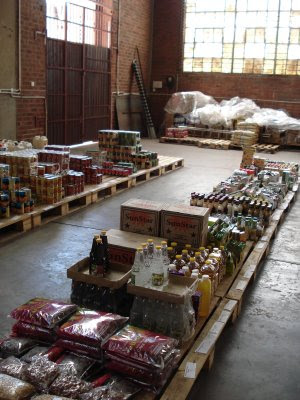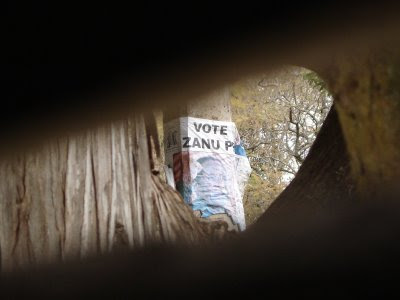.JPG)
With the latest agreements around the new 'unity' government, it felt like there was a glimmer of hope in the air, though personally I think there's a lot more of the same old stuff still to come. The reduced tension is partly because foreign currency has been legalized, and food is readily available again, although things have become incredibly expensive. The Zim dollar seems to be officially dead, and I am returning to London with a collection of obsolete multi-billion banknotes. The Reserve Bank appears desperate for cash, and is trying to coerce shop owners and street vendors alike to pay hefty licence fees in order to operate in foreign currency. For a street vendor who earns maybe $50 a month, $20 would be sucked up by a licence. For a shop owner in the northern suburbs, a licence would be more along the lines of $1000 a month, also beyond the means of many. Whether people will comply is yet to be seen. Phone invoices and other utility bills have suddenly arrived in US dollars, with no advance warning. My parents' landline bill shouted out a grand $265 for January (!) - compared to something more along the lines of $15-20 in previous months. Again, most people are doing a typically Zimbabwean 'wait and see' before taking any action, as they know that it's all likely to change again before long.
To give you an idea of just how expensive things have become, here's a sample list:
Bunch of spinach (side of the road): $0.50
Commuter taxi fare: $1.00
Tin of chopped tomatoes (TM supermarket, Kamfinsa): $1.50
Newspaper $2.00
Block of basic cheese (Green Park supermarket): $3.60
Gym class (Rolf Valley): $4.00
2kg rice (Import depot, Msasa, see photo below): $5.10
Doctor's appointment: $30
Termly fee at a top private senior school: $1200
Caesarian baby delivery (Avenues Clinic, no water available): $4000
Garden flat/apartment in Avondale complex: $250 000 cash.
The only thing which is cheap is alcohol: a can of beer works out at $0.60. Prior to the US dollar being legalized, fuel coupons were being used as a currency, meaning that there is now a significant surplus of coupons on the market. Large numbers of unemployed young men loiter around the entrance of the Redan fuel depot in Msasa, avoiding the police where necessary, in the hope of selling these off at a discount. For those who are able to do this at scale, there is money to be made.
There is considerable wealth around, as ever. Niche-filling entrepeneurs are reported to be raking in profits of, for example, $10 000 a month in the goods transport business. One of my ever-informative Joburg taxi drivers told me all about a regular Zimbabwean client of his who owns a construction company amongst others, re-sells South African liquor at a 300% profit in Harare...and owns 2 Hummers. Given that loans, bonds and mortgages don't really seem to exist, houses are paid for in cash. I met an estate agent who'd had a client show up with $400 000 in a bag.
Meanwhile, the vast majority of children haven't been back to school this year, except at a handful of private schools which have mobilised enough foreign currency to pay their teachers. Even my parents' domestic worker now has his eldest child enrolled at a private school - having already paid for fees, uniforms and books at her government school, where the teachers understandably have simply not returned to work this year. At the National Archives, the shelving for vast quantities of valuable documentation is collapsing because people have been stealing the screws which hold them together. Crimes of all kinds seem to be a necessity for survival in Zimbabwe, but if we exclude politically-motivated violence, it's a far cry from Joburg and Cape Town. My brother's housemate takes both back wheels off his vehicle to deter thieves when storing it at home, which I have to say caused me more hilarity than concern, especially when combined with a propped-open bonnet to prevent rats nesting in the cosy engine.
The most striking thing for me is people's cynicism and complete lack of trust in all systems and institutions, particularly government-related, but also on the individual level. It seems to cut across class, race and other lines of affiliation, and I wonder if and how this can be overcome. Many people are so tired of injustice and exploitation at all levels - but at the same time have probably become exploitative themselves in order to make ends meet. Foreign currency accounts are now apparently easy to open, as channels for funds from abroad, but there are so many stories of money transfers going 'missing', that few people seem willing to take the risk. Their take on it is simply that the Reserve Bank is either stealing their money altogether, or borrowing it for a few weeks to pilfer the interest.
Civil servants have found innovative ways to supplement their incomes. A good example is a local police inspector who uses his government vehicle for all sorts of odd jobs, ranging from a taxi service to assisting wealthier residents in the northern suburbs with services like removing household garbage (which the municipality has not done for years now). Normality and the threat of violence continue to co-exist in bizarre synchrony. Like the one evening we sipped our South African red wine (purchased for $5 a bottle from a large stockpile in someone's home garage in Glen Lorne), while two water cannon tanks provided by the Israelis zoomed past in the direction of Chikurubi Prison. Another afternoon we even crossed paths with Uncle Bob himself and have to pull over on Borrowdale Rd for the Presidential motorcade to pass. It is still made up of about 12 vehicles, including 10 heavily armed men on an open truck, but this time the wailing sirens were considerably muted. I couldn't help but get the impression that he is now slinking about his business with unease, and perhaps starting to keep a lower profile.
I end with a typically incongruous Zimbabwean encounter that my mother and I had with the police at a roadblock on the Domboshawa road. A sort of considerate and genteel corruption, if you like.
Policeman: Can I see your driver's licence.
Mum [left it at home]: Umm, sorry, I don't have it...we're going up Domboshawa and umm, I didn't want it to fall out of my pocket whilst walking.
Policeman [pedantic]: Do you know that before you even pick up your car keys, you should pick up your drivers licence?
Mum: Nodding
Me: Yes, I always tell her she needs to remember her licence.
Mum: Nodding
Policeman: [more pedantic] And how are we going to identify you if you have an accident?
Mum: Nodding
Policeman: Goes on with a long and apparently sincere lecture about the importance of the drivers licence.
Policeman: So, in order to help you not to forget your licence, we are going to have to fine you.
Mum: Umm, Ok. How much?
Policeman: $20 [fines used to be about $0.50, so this is quite something].
Me: Hmm, the problem is, we don't even have $20 on us [truthful].
Mum: I will have to drive all the way home and then return here...and....
Me: You see, we're going to Domboshawa and we need some of our money for the entrance fee...
Policeman: [contemplates the situation] Ok, so how much can you pay?
Me: Umm, ok, so we need about $4 for Domboshawa and we have about $14, and...[tries to do calculations and weighs up situation]..I think we can pay you $4.
Policeman: Ok, you can fill out the book.
Me: using the old fuel drum on the side of the road as a table, filling out the 'Admission of Guilt' form with my details, even though Mum is the driver.
Policeman: pockets the mixture of dollars and rands.
Policeman: So how old are you?
Me: I'm 28.
Policeman: And why are you still unmarried?
Me: [measure of feminist sarcasm] Well, I'm just waiting for the right man to come along.
Policeman [assuredly]: You are being too selective.
Me: Yes, you're probably right...
And with that classic piece of relationship advice, off we went to Domboshawa. Just another afternoon in the postcolony.
.JPG)


.JPG)

.JPG)
.JPG)
.JPG)
.JPG)

.JPG)

.JPG)
.JPG)


.JPG)


b.JPG)


.JPG)


